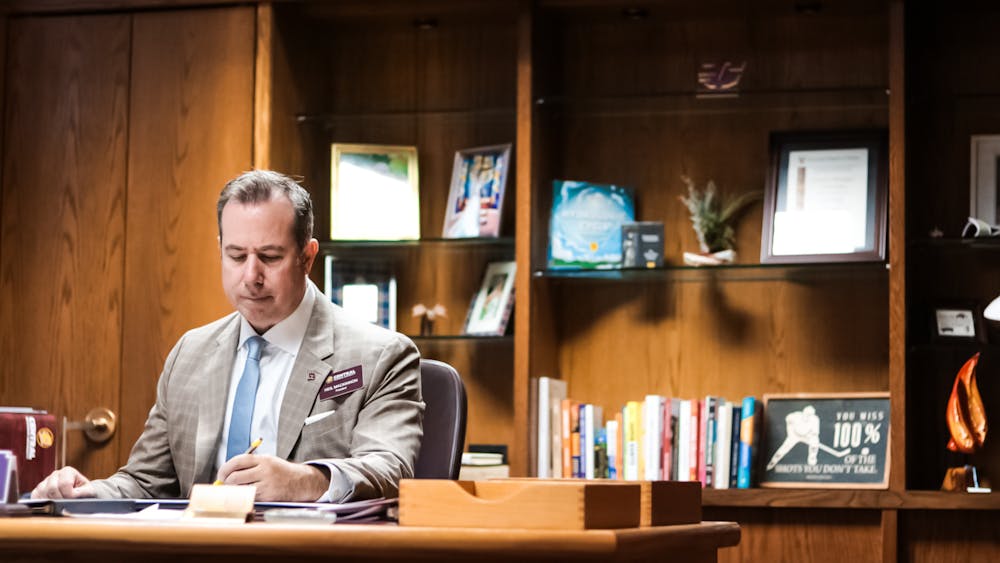COLUMN: No, it is not illegal for photographers to take your photo in public
It's a beautiful Saturday evening during early autumn in Mount Pleasant. You, along with other Central Michigan University students, are celebrating your last night of freedom before the pressure of classes begins by playing beer pong with friends on your front lawn on Main Street.
You feel a tap on your shoulder and when you look up, your friend next to you points to someone on the sidewalk. The stranger is angled directly toward you, staring at you through the lens of a camera.
Hi, that's me.
Now, whether your response to seeing me is to throw your beer-holding hand up to the heavens while shouting, "Fire up Chips!" with a smile on your face or is to yell angrily in my direction and attempt to cover my lens with your hand, the photo I capture of you will have been taken in a completely legal and ethical manner.
As a photojournalist, it's my job to visually capture what's happening on campus and in the Mount Pleasant community. To protect the photojournalist's ability to do their job properly, the government has established laws.
According to the American Civil Liberties Union, photographers have the right to photograph anything or anyone in public that is "in plain view."
Your front lawn is not a public place, but the sidewalk is. Your front lawn is in plain view of where I'm standing. If I step off the sidewalk and onto your lawn, you are fully within your legal rights to ask me to leave.
What is never within your legal right, however, is to grapple with a photographer's gear or threaten them. Doing so is considered a criminal offense by a law enforcement agency.
These rules also apply to government bodies and law enforcement itself.
The public is becoming increasingly knowledgeable that it is within a private citizen's legal rights to take photographs and video of law enforcement officers. It is also within a private citizen's legal rights to take photos of government buildings, although some nuclear waste facilities and military installations are exempt from this rule.
Laws explained, photographers aren't without heart. If you see one of us taking a photo of you and you have just reason to request no other photos be taken of you, feel free to talk to us. It doesn't mean we will follow the request; for example, if you're a minor in possession of alcohol on someone's lawn and a photo is taken of you imbibing, that was an action you decided to take while in the public's plain view.
However, if you're attempting to avoid detection from an abuser who may be able to access a public photo of you and discern your location or something of the like, talk to the photographer. Just because we're acting within the law doesn't mean we'll defend it at the risk of your genuine safety.
I've had a couple experiences where this has happened and although it frustrated me, I trusted the individuals who requested I do not use their photos had good reason to say so.
The first experience with this happened when I was working on a project for a journalism course at a coffee shop in Lansing. I was taking a photo of the baristas behind the counter, when a patron looked at me and said:
"I'd like to not be in your photo please."
I explained the project was for school, but the woman just looked at me, apologetically frowned and shrugged. So I honored her request.
The second experience happened on CMU's campus during the mobile Secretary of State's open hours outside the Bovee University Center in October. I was taking photos for an article on student voting trends, when a woman stared at me and promptly said she didn't want to be in my photograph.
I responded by saying it was perfectly legal for me to do so, so in the future to be aware of that. One of the aides piped up and said it shouldn't be an issue to just not take her photo. I explained to her I was planning on respecting the woman's request, but that she should know that it's fully legal for me to have her photograph if she's in public.
It's stressful for both parties, trust me. I don't want to intrude, but use your common sense when conducting yourself in public. If you wouldn't want someone you care about to see it, don't do it. If you decide to do it anyway, don't get mad at the photographer who decides your antics are newsworthy.







